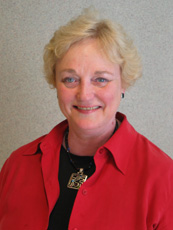 Barbara Piper, D.N.Sc., knows a lot about fatigue.
Barbara Piper, D.N.Sc., knows a lot about fatigue.
In fact, the UNMC College of Nursing associate professor is known around the world for her expertise on cancer-related fatigue and anemia.
Recently she was one of four invited to speak at an inaugural National Comprehensive Cancer Network (NCCN) advance practice conference where she made a presentation about fatigue and anemia to about 100 advanced practice nurses.
“It was quite an honor to be asked to present,” Dr. Piper said.
Dr. Piper’s work for the NCCN, a not-for-profit alliance of 19 of the leading cancer centers in the United States, began in 1999 when she was invited as an expert panel member to represent the UNMC Eppley Cancer Center on a committee to help form the network’s first national Cancer-Related Fatigue clinical practice guidelines. The committee published the first guidelines in 2000.
“We dialog and bring together studies and articles on the latest research which are used to revise the guidelines for use by health professionals and consumers,” she said. “The guidelines are rather unique. They’re pretty innovative.
They’re also important, Dr. Piper said, because they bridge the gap between research and practitioners. “Not all health providers have the opportunity, time or inclination to do a literature review on current treatments,” she said. “The guidelines help set the bar for what we believe is best based on research – it ensures the best practice guidelines.”
Studies demonstrate that quality of life is lower for people with high levels of fatigue, Dr. Piper said. Fatigue affects people physically, socially, emotionally and economically, if they cannot work due to fatigue, Dr. Piper said. “It has a major impact on all aspects of life and I suspect it’s associated with poor disease or treatment outcomes. Patients may not be able to take a full course of therapy.”
Practitioners aren’t using standardized measurement tools for patient fatigue, which would ensure that patients are asked about their fatigue level so providers could document what to do about it. “Now it’s a hit or miss approach to fatigue,” she said.
Guidelines also benefit consumers by educating them about treatment and resources, she said. The American Cancer Society and the NCCN collaborate to produce free materials in ways consumers can use them.
“I think the NCCN is doing a tremendous service by providing this major resource in cancer care in the country and world,” Dr. Piper said.
In 1984, Dr. Piper developed an instrument — the Piper Fatigue Scale — to measure fatigue subjectively in cancer patients. At the time, only two subjective fatigue scales existed — one developed in healthy airmen, the other measuring fatigue in healthy Japanese industrial workers. It was the first multidimensional subjective fatigue scale developed for patients.
Health professionals around the world have used the Piper Fatigue Scale to counsel patients and their families about ways of decreasing fatigue by preventing it or reducing its impact, said Jan Atwood, Ph.D., Niedfelt Professor in the UNMC College of Nursing.
“This helps patients feel better faster and function better in their family, at work or school. This scale is the most widely used instrument of its kind world-wide and is used extensively in research,” Dr. Atwood said.
Dr. Piper’s interest in cancer fatigue began as a staff nurse almost 30 years ago. In 1979, she began doing research at a time when little was being done, though fatigue was considered a major side effect of radiation and chemotherapy.
She has received funding support from grants totaling more than $2.4 million from sources including the National Institutes of Health, the Department of Health and Human Services, American Cancer Society, Oncology Nursing Foundation, UNMC, pharmaceutical firms and nursing organizations.
She has made more than 140 international, national and local presentations, given 19 published press interviews and has published 10 data-based articles, 25 review or practice-based articles, and eight chapters.
To learn more about cancer or get free cancer treatment guides, go to the NCCN’s Web site at www.nccn.org or call the NCCN toll-free at 1-888-909-NCCN. Materials also are available on the American Cancer Society’s Web site at www.cancer.org or by calling 1-800-ACS-2345.